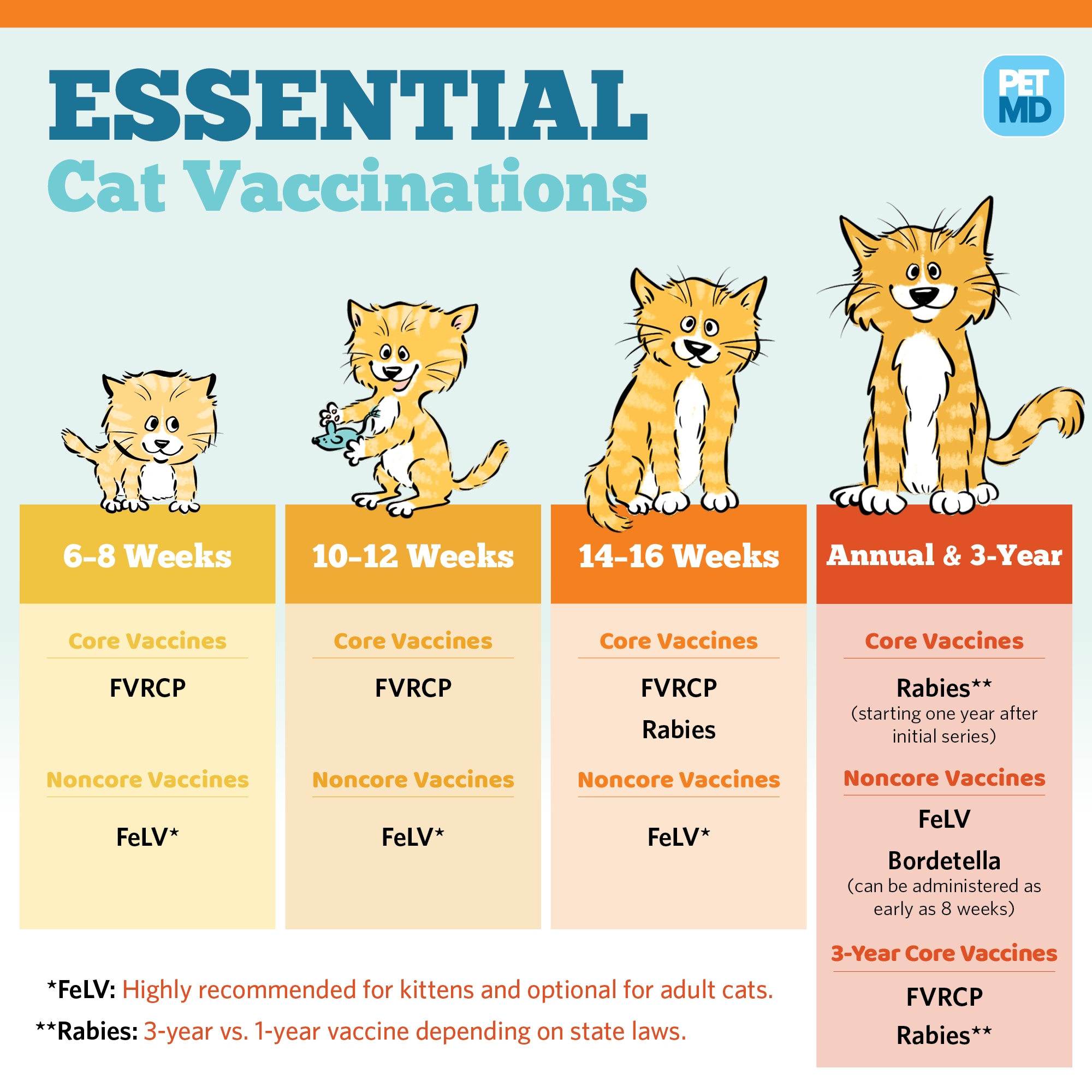What Vaccines Do Cats Need Yearly
Those that protect against the most common and most serious diseases. According to the American Association of Feline Practitioners AAFP the core vaccines those that are recommended for ALL cats are feline panleukopenia virus FPV feline herpesvirus-1 FHV-1 and feline calicivirus FCV as well as Rabies.
Core vaccines according to the World Small Animal Veterinary Association WSAVA are those which every dog or cat must receive no matter their age environment habits breed or circumstance.

What vaccines do cats need yearly. Your cat will need to have regular booster jabs to make sure they stay fully protected throughout their life. Core vaccines are those on the cat vaccination schedule that are appropriate for cats regardless of where in the world they live. Speak to your vet if youre not sure when your cat is due and write down any future dates so you dont forget them.
Most cats start their primary course of vaccinations as a kitten at around 9 weeks old but any adult cat that hasnt ever been vaccinated or hasnt been kept up to date with their yearly boosters will also need a primary course. There is a cat flu vaccine that is given to your cat routinely as part of their annual vaccination programme. Cat flu feline herpes virus and feline calicivirus Feline infectious enteritis.
7 lignes Adenovirus type 1 CAV-1 canine hepatitis Depends on vaccine. Cats are commonly vaccinated against. The American Association of Feline Practitioners also recommends rabies vaccination for cats based on the local regulation and a tri-annual FVRCP vaccination to keep your cat in tip top shape.
This is intended to give your cat protection from the two common viruses that cause flu. Core vaccines help prevent animals from contracting life-threatening diseases that have a global distribution. For instance the intranasal one.
However human flu is quite different to cat flu as there are potentially hundreds of viruses that cause human flu but only the FHV-1 and FCV virus can cause cat flu. Then they must be boostered a year later. Currently the American Association of Feline Practitioners AAFP vaccination guidelines recommend that low-risk adult cats that received the full booster series of vaccines as kittens can be vaccinated every three years for the core vaccines feline viral rhinotracheitis feline calicivirus feline panleukopenia and rabies and then as determined by your veterinarian for any non-core vaccines such as feline.
Usually boosters are needed once a year and most vet practices will send you a reminder if youve had jabs there before. Most animals need only what are known as core vaccines. In addition to seasonal flu influenza vaccine and Td or Tdap vaccine Tetanus diphtheria and pertussis you should also get HPV vaccine which protects against the types of human papillomaviruses HPV that cause most cervical anal and other.
There are a number of non-core feline vaccines available but most are not widely recommended. If youre introducing another cat with an unknown vaccination history to your household if possible ensure vaccination with core vaccines at least a week before bringing the cat. After this the cat should receive a vaccination every 13 years.
Kitten shots are phenomenally important and unvaccinated kittens succumb to feline panleukopenia at high rates. The FVRCP vaccine is important for all cats including indoor cats because it protects against three viruses that are airborne and spread without cat-to-cat contact. The shots come in a series every 3 to 4 weeks.
The Australian Veterinary Association AVA splits recommended cat vaccinations into core and non-core vaccines. If you have a cat who is an adult but has not been vaccinated or whose vaccination history or status is unknown they will need two doses of the core vaccination 34 weeks apart. Adult cats need shots less often usually every year or every 3 years depending on how long a vaccine is.
Your vet can advise which vaccinations your cat or kitten will need to help protect them from infectious diseases. I therefore recommend that all cat. Kittens should receive this shot at 6-8 weeks because they are very vulnerable to calicivirus and distemper.
Your kittencat will usually have full protection seven to ten days after the final injection of their primary course until then you will need to keep them.

Animal Rescue Of The Rockies Spay Day Flyer For Print Social Media Dog Spay Animal Rescue Cat Neutering

It S Nationalbringyourcattothevetday Make Sure Your Feline Friend Stays In Too Top Shape With Annual Check Ups At The Vet Healthy Pets Cat Food Food Animals

Cost Of Pet Care Cat Care Cat Care Tips Kitten Care

8 Steps To Take The Best Care Of Your Cat

National Take Your Cat To Vet Day Graphic Pet Clinic Feline Health Preventive Care

Kitten Vaccinations Vaccination Schedule For Cats Petmd

7 Reason To Take Your Cat To The Vet Pet Funny Cat Health Cat Health Care Cat Health Problems

Annual Pet Cost Info Graphic Dog Care Pets Infographic

August 22nd Is National Take Your Cat To The Vet Day And The Cat Community Wants You To Help Keep Your Cat Healthy With Rou Veterinary Care Cat Care Cat Health

Here Is A Simple Routine For Your Cat Routine Cat Cat Routine Simple Pet Care Cats Cats Kitten Care

Learn The Difference Between Play Fighting And Real Cat Fights Cats Cat Playing Cat Facts
/adult-cat-vaccination-schedule-4846632_V4-ff36ccb34d74410d9652b4307a26e8b3.png)
What Is The Average Adult Cat Vaccination Schedule

Felineliving Net Heavy Breathing Cat Breathing Problems Cat Health

20 Aww Dorable Cats Casually Crossing Their Paws Cats Christmas Cats Sleepy Animals

Digital Cat Care Journal Pdf Pet Care Planner And Health Etsy Pet Care Pet Care Cats Pet Sitter Instructions





Post a Comment for "What Vaccines Do Cats Need Yearly"